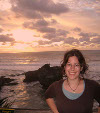Tag: Jo Wolfe

Jo is a postdoctoral fellow at the American Museum of Natural History in New York City. She received her Bachelor of Science degree from the University of Toronto in Canada, and her PhD from Yale University in New Haven, Connecticut. Her education and research consists of equal parts palaeontology, genomics and developmental biology. A particular focus is the contribution of fossil and developmental information (and their biases) to reconstructing evolutionary relationships among animals, especially arthropods. Currently she is using next-generation molecular sequencing to study gene expression and body-plan evolution in decapod crustaceans (crabs, shrimp and lobsters). Cambrian fossils, however, have been her truest inspiration ever since she first read about them at the age of 8!
Dr Jo Wolfe, Division of Invertebrate Zoology & Sackler Institute for Comparative Genomics, American Museum of Natural History, Central Park West at 79th Street, New York, NY 10024, USA.